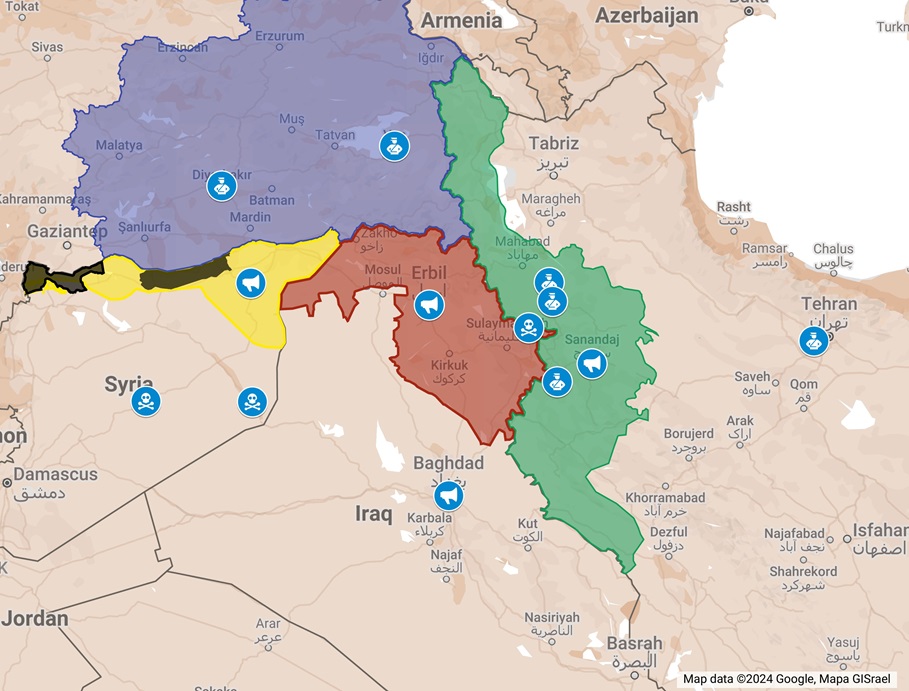1.5K
A weekly brief of events occurred in the Kurdistan regions of Iran, Iraq, Syria, and Turkey.
Iran
- On June 17, a grenade from the Iran-Iraq War detonated and killed a Kurd named Hadi Ghunchadoost in Baneh. On June 21, Iranian intelligence officers unlawfully seized a Kurd from Saqqez named Aram Ostadi and took him to an unknown location. That same day, Iranian authorities arrested four Kurds in Paveh named Zana Saeedi, Arah Ebrahimi, Shwan Ahmadi, and Miqdad Balabzani. Also on June 21, Iranian authorities detained a Kurd from Bokan named Ismail Pourabdollah. Saeedi, Ebrahimi, Ahmadi, Balabzani, and Pourbdollah were all illegally detained, and their whereabouts remain unknown. Further, on June 22, an Iran court sentenced three labor activists who have been detained since April 2022 to two years in prison.
- Iranians will head to the polls on June 28 to elect a new president. Iran’s previous president, Ebrahim Raisi, died in a helicopter crash on May 19. Six candidates are competing in Friday’s election. Saeed Jalili, Alireza Zakani, and Amir Hossein Ghazizadeh Hashemi are all hardline allies of Raisi. Mohammad Bagher Ghalibaf and Mostafa Pouurmohammadi are viewed as moderates, and Masoud Pezeshkian is the lone reformist candidate. Turnout is expected to be low for this election, as a survey conducted by the Netherlands-based Gamaan Institute found two-thirds of Iranians do not intend to vote on Friday, ostensibly to protest the regime’s callous policy towards protesters and failure to rein in inflation. If no candidate receives at least 50 percent of the vote, a run-off election will be held. On June 23, Pezeshkian announced that he would resolve issues concerning Kurdish border porters (kolbars) in a desperate attempt to win Kurdish votes. On June 21, Iranian border guards ambushed and killed a 29-year-old kolbar near Sarvabad. Iranian authorities killed eight kolbars in May, twice the number they killed in April.
Iraq
- On Monday, Iraq’s Independent High Electoral Commission (IHEC) stated it would be hard to hold the Kurdistan Regional Government’s (KRG) parliamentary elections on September 5. An IHEC spokesperson said, “It is difficult to hold elections on September 5 and we cannot hold the elections on that date. That date was set a month ago and the commission determines its work on the basis of the official date of the elections.” President of Kurdistan Region Nechirvan Barzani has yet to set an official date for the elections. The IHEC postponed the parliamentary elections scheduled for June 10 in May, which led to talks of holding elections on September 5. That said, the IHEC vowed to hold the elections before its mandate expires in January 2025.
- On June 16, the U.S. designated Iraq-based militia Harakat Ansar Allah al Awfiya (HAAA) as a terrorist organization for its involvement in attacks on U.S. interests, most notably the January 2024 attack on a base in Jordan that killed three U.S. personnel and injured 34. Two days later, HAAA released a statement saying it considers the designation “a badge of honor.” HAAA has close ties to Iran’s Islamic Revolutionary Guard Corps (IRGC), which has acted against U.S. interests in Iraq and Syria over 100 times since October 2023. U.S. Ambassador to Iraq Alina Romanowski stated that HAAA’s designation reflects the U.S.’s commitment to stamping out “Iran’s malign influence and the threats posed by Iran-affiliated militias.” HAAA is also suspected of kidnapping and killing protesters affiliated with the 2019 Tishreen movement that sought better job opportunities and improved social services from Baghdad.
Syria
- The Syrian Observatory for Human Rights reported the U.S.-led Coalition and the Syrian Democratic Forces (SDF) conducted several joint operations to counter ISIS’s (Da’esh) increased operational tempo in northeastern Syria. The U.S. also intercepted a drone launched by Iran-backed militias that targeted the al Tanf garrison on June 22. That said, Da’esh terrorists killed at least one SDF member in Deir Ez Zor Governorate’s Bahra town. Da’esh also killed six Assad regime soldiers and a colonel in Syria’s Badia region. Likewise, the North Press Agency reported that Da’esh operatives seized a weapons shipment when they ambushed an Assad regime convoy traveling from Palmyra to the T4 military base on Sunday. Concomitantly, the U.S. Department of the Treasury sanctioned four individuals from Uzbekistan and Georgia for links to a Da’esh smuggling network.
- Turkish-backed Syrian factions arrested several civilians in occupied Afrin. Also in Afrin, the Turkish Humanitarian Relief Foundation (IHH) approved the construction of a new settlement on Kurdish lands. Local Kurds recently accused the Qatar Red Crescent and several Kuwaiti organizations of building settlements for non-Kurds to engineer demographic change. Turkish-backed groups previously demolished a Yazidi shrine in Afrin on June 13.
Turkey
- Last week, Turkish police detained dozens of people in the Kurdish region, including in Diyarbakir (Amed), Van, and Dersim. Concurrently, following the removal of the Kurdish mayor in Hakkari, the Turkish government imposed travel bans on several Kurdish mayors, amid concerns over further dismissals of elected Kurdish officials who seek international funding to address debts incurred by government-appointed trustees before the March elections. In another development, the government advanced to the second phase of the “Kobani Case” hearing, where five politicians, including several Kurds and former Armenian lawmaker Garo Paylan, face lengthy prison sentences. In late May, an Ankara court sentenced several politicians to a total of 407 years in prison. Members of the Dem Party protested outside the court, with Tülay Hatimoğulları, the party’s co-chair, stating, “This [court] decision is a pro-ISIS decision. We never accept these decisions.” The “Kobani Case’‘ stems from protests by Kurds in Turkey against Da’esh terrorists in 2014, who attacked the Syrian Kurdish city of Kobani.

